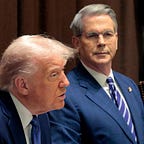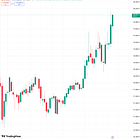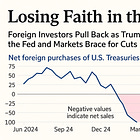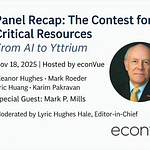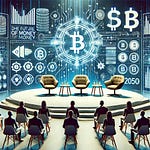75 minutes (with Q&A) ∙ 27 registrants AUDIO:
⮑ Ended WEDS JUL 9, 2025 4:15 PM CDT (Chicago)
32:36
🚫 Q&A session was off the record and is unavailable.💬 Although there are many reasons for optimism, a lot could still go wrong. What signals should we be watching?
Introduction
Our panel last week, as the United States reached its 249th year, agreed that there are many reasons to celebrate. Job numbers remain strong despite headlines about layoffs and automation. Markets are booming—touching record highs in both traditional and new asset classes. Inflation seems under control, oil prices are falling, and the specter of nuclear escalation in Iran has been contained, at least for now. Even the US-China trade war appears to have cooled. Today’s CPI numbers were pretty much as expected.
My takeaway
A common thread in our discussion: trust. US partners and rivals alike are unsure of policy direction in Washington, and so are behaving cautiously. Although the real economy and markets in the US are giving President Trump the benefit of the doubt, our allies are confused. An interesting sidelight is that the best-performing asset is Bitcoin, which is a trustless cryptocurrency. Please see new posts by econVue contributors on these subjects below.
Upcoming panels will focus on Asia Pacific geoeconomic issues. Watch your inbox for future dates.
–𝓁𝓎𝓇𝒾𝒸
Editor-in-Chief & Moderator
Discussed on this Panel
Our panel of global experts assessed the resilience of the American economy—and the risks it now faces from rising tariffs, falling trust, and fiscal disarray:
• Marsha Vande Berg (Pension and Sovereign Wealth Advisor)
• Karim Pakravan (Economist, Random Access Economics)
• Gordon Parrish (Free Markets Inc.)
• Michele Wucker (Author of The Gray Rhino)
• Eric Huang (Taiwan & Semiconductor Specialist at Hale Strategic)
• Special Guest: Joel Ross (Investor and Author of the Ross Rant)
⧈ Insights
Markets Are Rising—But So Is Risk
Despite record market highs and falling oil prices, panelists warned of fundamental fragility masked by short-term optimism.
Trust Is the New Indicator
Both Marsha Vande Berg and Karim Pakravan emphasized that erosion of investor trust—especially among foreign bondholders—could trigger deeper instability.
Trump’s Tariff Strategy Is Reshaping Trade
Gordon Parrish described bipartisan support for a harder line on China, calling it a rare point of consensus that could escalate.
Taiwan: Strategic and Symbolic
Eric Huang warned that economic decoupling and military pressure on Taiwan is not just about semiconductors—“it’s about trust.”
What’s Next for the Fed?
With Powell’s term ending in May 2026, speculation swirled about his replacement. Could Trump tap Bessent to lead both the Fed and Treasury? Rumors have circulated that Scott Bessent could be tapped for a dual-role appointment as both Fed Chair and Treasury Secretary. But such a move would violate the 1935 Banking Act, which explicitly separates the two offices to safeguard US monetary independence.
❝ Resilience is the new catchword. Investors aren’t leaving dollar assets—they’re diversifying away from concentration risk.
❝ The word that kept rolling around in my head was trust. Bottom line, I think that’s what we’re seeing reflected in both markets and institutions.”
❝ We’re already on a knife’s edge. If the foreigners don’t trust us to manage our treasury market well, they’ll just stay away.
❝ We’re going to end up with fairly high tariffs—and that’s going to put pressure on the macro economy and accelerate the ‘sell America’ trend.
Gordon Parrish
❝ The entire Republican spectrum—mercantilists, free traders, neoconservatives—are all united in their desire to take down China.
❝ Powell will stay in control until May. Whoever comes next will just be Powell with another face.
❝ In the U.S. market, tariffs as a percentage of the final thing that consumers pay are just very small. They don’t really affect our services. They don’t affect the transportation, the storage, the marketing, the intermediate markups. It’s just the cost of goods sold at the border. And that’s not a big amount.
Michele Wucker
❝ International opinion of China has now surpassed the US—that has flipped. China is trying to capitalize on this shift.
❝ They were surprisingly optimistic about Trump in Beijing—perhaps because they feel they can negotiate with him.
Eric Huang
❝ Taiwan’s role is not just about chips. It’s about trust. If you want to break the global economy, you start by breaking Taiwan.
❝ Strategic decoupling has become a race—not just for economic security but for legitimacy in global governance.
Joel Ross
❝ The market isn’t pricing in the risk. Investors are chasing performance, not preparing for disruption.
❝ We’ve seen this movie before—people believe the Fed will step in no matter what. But if rates stay high, balance sheets will be exposed.
What to Watch Next
• July inflation numbers and their impact on Fed sentiment
• Reactions to new tariffs across Asia and Europe
• Shifts in foreign holdings of US Treasuries—are we nearing a tipping point?
• Growing divergence between equity market exuberance and bond market caution
• Whether the White House floats formal nominations for Fed or Treasury posts—and how the markets react
⧉ Backgrounder & Recommended Reading
Polling & Sentiment on the OBBB (One Big Beautiful Bill)
• KFF Poll: Views of the Bill
• Axios: Trump’s Bill & Public Support
• Kiplinger: Why Most Americans Say It Isn’t So Beautiful
By Our Panelists
• Karim Pakravan: The Specters Haunting the Global Economy
📬 Subscribe to stay informed. We’ll continue to track global risks, investor behavior, and policy decisions in real time.
Expert Voices. Global Focus. Informed Perspective.
If you are not yet a paid econVue subscriber and would like to attend our next panel discussion, explore your options here:


